Understanding the Science of Aging Support
Aging supplements are specialized nutritional products designed to support healthy aging by addressing specific cellular and metabolic processes that decline with age. Here's what the science tells us about the most effective options:
| Top Aging Supplements | Main Benefits | Scientific Support |
|---|---|---|
| Vitamin D3 + K2 | Bone health, immune function, cognition | Strong evidence from multiple clinical trials |
| Omega-3 Fatty Acids | Heart health, inflammation reduction, brain function | Well-established in cardiovascular research |
| Collagen Peptides | Skin elasticity, joint comfort | Positive results in 12-week human studies |
| Coenzyme Q10 | Energy production, heart health | Beneficial especially for those on statins |
| Resveratrol | Metabolic health, circulation | Emerging research on longevity pathways |
| Curcumin | Inflammation control, joint mobility | Multiple clinical trials on bioavailable forms |
| Probiotics/Prebiotics | Gut health, immune resilience | Two-thirds of older adults show improvements |
The quest for healthy aging isn't about finding a magical fountain of youth. It's about understanding which cellular processes naturally decline with age and how specific nutrients can support them.
As we age, our bodies face several challenges: declining hormone levels, reduced cellular energy production, increased inflammation, and decreased absorption of key nutrients. This creates gaps that well-chosen supplements can help fill.
But not all aging supplements deliver on their promises. The difference lies in scientific backing, quality formulation, and proper dosing.
I'm Michelle M. Henson, and as Head of Copywriting and Legal Compliance Editor for Juvenon, I've spent over two decades researching and explaining the science behind aging supplements that are backed by clinical evidence rather than marketing hype.
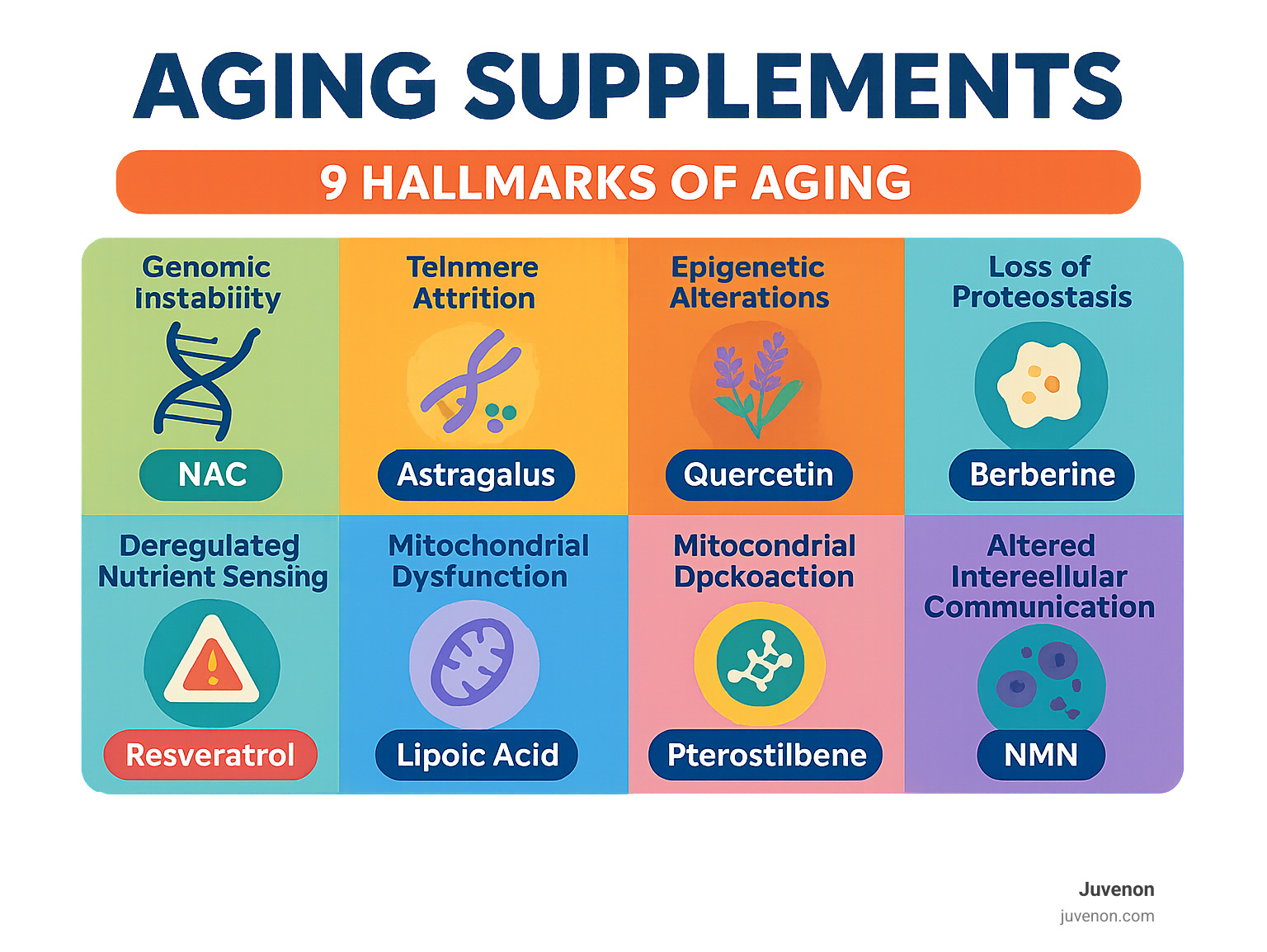
How We Chose the Best Aging Supplements
When it comes to aging supplements, I don't just chase trends or flashy marketing claims. At Juvenon, our approach is grounded in what actually works according to science. Think of us as your research-loving friend who reads all the fine print so you don't have to.
We evaluate each ingredient with a critical but hopeful eye, looking for:
Actual human studies (not just test tubes or mice) showing real benefits that you'd notice in your daily life. Lab results are interesting, but we want to know how supplements perform in real bodies like yours.
Bioavailability matters tremendously - because what good is a supplement if your body can't properly absorb it? Some forms of nutrients are simply better at making it into your bloodstream than others.
Safety always comes first. We carefully document potential side effects and how supplements might interact with medications that are common as we age.
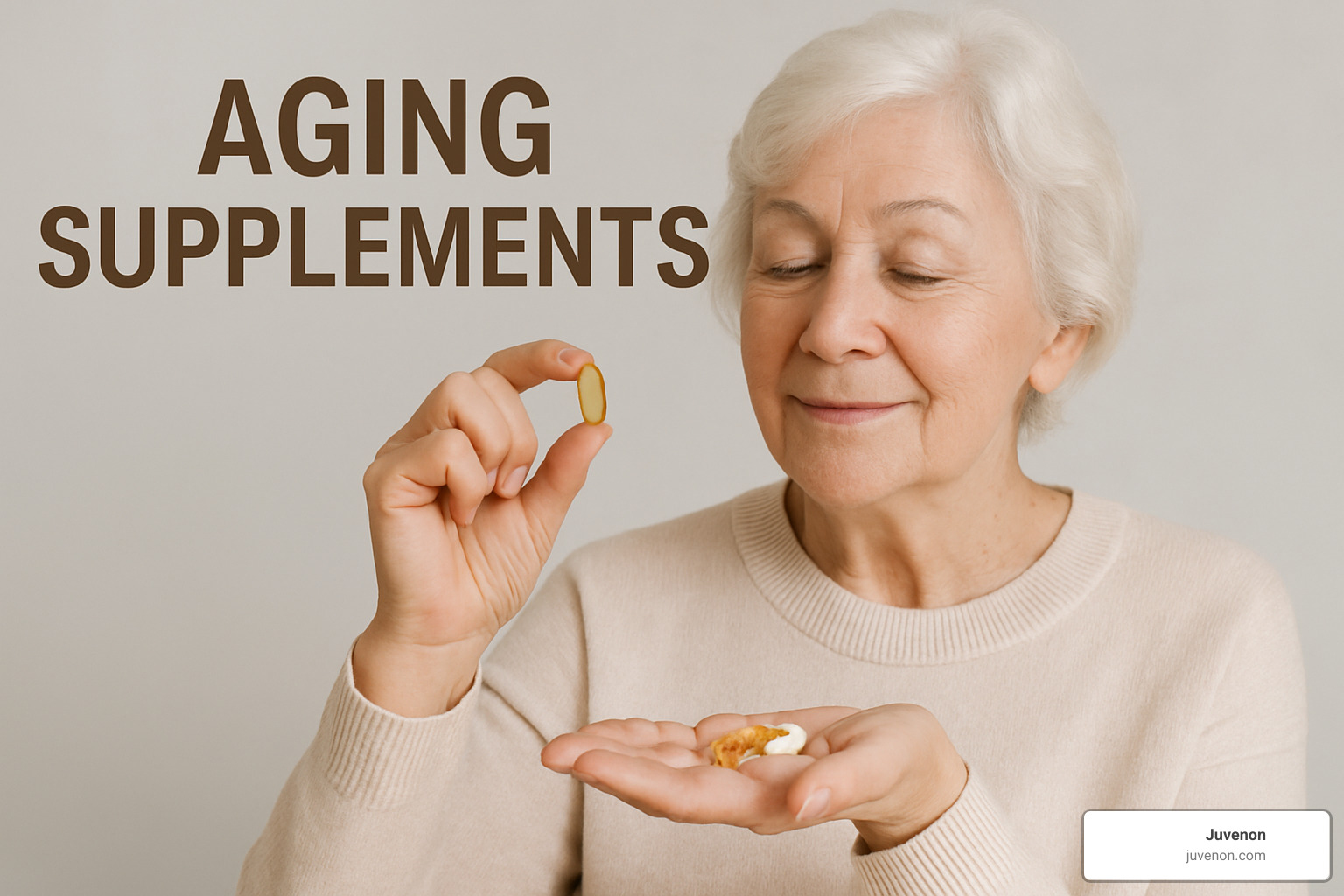
Did you know the FDA regulates supplements differently than prescription medications? While drugs must complete rigorous clinical trials before approval, supplements don't require the same pre-market testing. This makes choosing evidence-backed products even more important. You can learn more about this distinction through the Scientific research on dietary supplements from the NIH.
Our vetting checklist for aging supplements
Before any ingredient makes it into a Juvenon formula, it faces our comprehensive evaluation - think of it as a supplement talent show where only the best performers make the cut.
Potency verification is non-negotiable. The active compounds must match what's claimed on the label - no shortcuts. Purity testing ensures you're not getting unwanted guests like heavy metals or microbes. We also analyze stability because a supplement should remain potent throughout its entire shelf life.
We pay special attention to how supplements interact with common medications and age-related conditions. After all, aging supplements should solve problems, not create new ones.
As we age, our bodies face specific challenges: decreased absorption of nutrients (especially B12, calcium, and iron), reduced production of compounds like CoQ10 and collagen, changes in gut microbiome, increased inflammation, and altered medication metabolism. Our supplement selection addresses these age-related changes head-on.
Why food-first still matters with aging supplements
I'll let you in on a little secret - even though we make supplements, we still believe food comes first! Here's why:
Whole foods contain complex nutrient matrices that work together in ways science is still finding. It's like a symphony where all the instruments play together to create something better than solo performances.
The fiber in whole foods isn't just for keeping you regular (though that's important too!) - it actively supports gut health and helps with nutrient absorption.
As Dr. Bruce Ames, one of our scientific advisors, puts it: "Supplements fill in the gaps, but food provides the foundation." I love this way of thinking about it - your diet creates the stage where supplements can perform their best work.
This is especially true for older adults, who often benefit from both dietary improvements and targeted supplementation. Aging supplements work best when they're part of a holistic approach to health that starts with what's on your plate.
#1 Vitamin D3 + K2
Vitamin D3 with K2 tops our list of effective aging supplements because it's truly a dynamic duo for older adults. Think of it as the sunshine vitamin that keeps on giving – addressing multiple age-related concerns while fixing one of the most common nutritional gaps we see in people over 50.
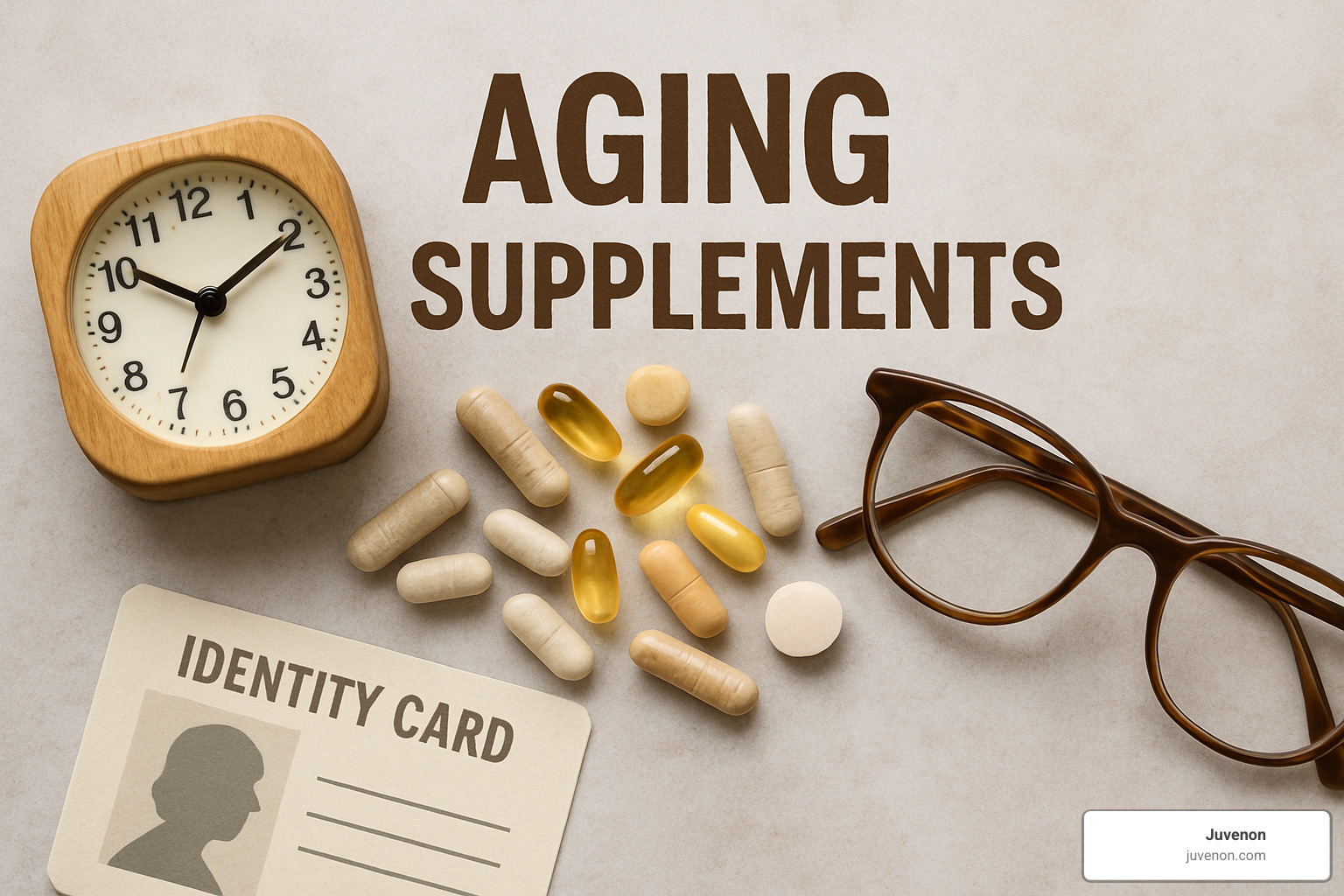
Let's talk about the impressive research behind this powerhouse combination. In a fascinating 12-month study, daily supplementation with 800 IU of vitamin D actually improved cognitive test scores and reduced cell damage in older adults with mild cognitive impairment. That's your brain getting a helping hand! Even more compelling, when researchers analyzed 18 randomized controlled trials with over 57,000 participants, they found something remarkable – daily vitamin D supplementation actually reduced overall mortality rates.
But here's the thing – vitamin D doesn't work its magic alone. It needs vitamin K2 as its partner. Think of vitamin D as the calcium collector, helping your body absorb this important mineral. Vitamin K2 is the traffic director, making sure that calcium builds up your bones rather than accumulating in your arteries where it doesn't belong.
Best for: widespread deficiency & brain-bone combo
Did you know that approximately 42% of Americans don't get enough vitamin D? And that number climbs even higher when we look specifically at older adults. This widespread deficiency is linked to some serious health concerns:
- Increased risk of falls and fractures (nobody wants that!)
- A weakened immune system when you need it most
- Cognitive decline and foggy thinking
- Muscle weakness that limits your independence
- Mood changes that affect your quality of life
What makes the vitamin D and K2 team particularly valuable as an aging supplement is how it supports both your thinking power and your bone strength – two major priorities for anyone over 50.
You might be wondering if you're running low on vitamin D. Common signs include feeling unusually tired, experiencing bone pain, dealing with muscle aches, noticing mood changes, or having wounds that seem slow to heal. Of course, the only way to know for sure is through a simple blood test.
How to take it safely
For most adults, the sweet spot for vitamin D3 supplementation falls between 1,000-4,000 IU daily. But your personal needs might vary based on several factors. Your current blood levels (ideally tested before you start supplementing) matter a lot. Age is important too – as we get older, our skin becomes less efficient at making vitamin D from sunlight. If you have darker skin, you naturally produce less vitamin D from sun exposure. Where you live makes a difference – those in northern climates with less sunshine often need more. And if you're carrying extra weight, you might need a higher dose since vitamin D is fat-soluble.
For vitamin K2, look for supplements providing between 90-180 mcg daily of the MK-7 form, which your body can use most effectively.
Important safety note: If you're taking blood thinners like warfarin (Coumadin), please talk to your doctor before adding any vitamin K supplements to your routine. These two don't always play nicely together, and your medication dosage might need adjustment.
#2 Omega-3 Fatty Acids (EPA/DHA)
When it comes to aging supplements that deliver serious results, omega-3 fatty acids are the real deal. These remarkable nutrients—especially EPA (eicosapentaenoic acid) and DHA (docosahexaenoic acid)—have some of the strongest scientific backing you'll find.
Here's something pretty amazing: researchers studying the Framingham Offspring Cohort finded that people with higher omega-3 levels in their red blood cells could expect to live about five years longer. That's like getting a biological time bonus! Another large study looking at over 42,000 people found that those with the highest omega-3 levels had a 15-18% lower risk of dying from any cause over 16 years.
But how exactly do omega-3s help us age better? They're multitaskers:
They calm the inflammation that silently damages our bodies as we age. Think of them as natural firefighters, putting out the low-grade inflammatory "fires" that drive many age-related conditions.
They're like personal trainers for your heart, improving rhythm, lowering triglycerides, and supporting healthy blood pressure.
Your brain absolutely loves DHA—it's actually a building block of brain cell membranes. Without enough, your thinking can get a bit foggy.
They even help preserve your telomeres—those protective caps on your DNA that naturally shorten as you age (think of them as the plastic tips on shoelaces that prevent fraying).
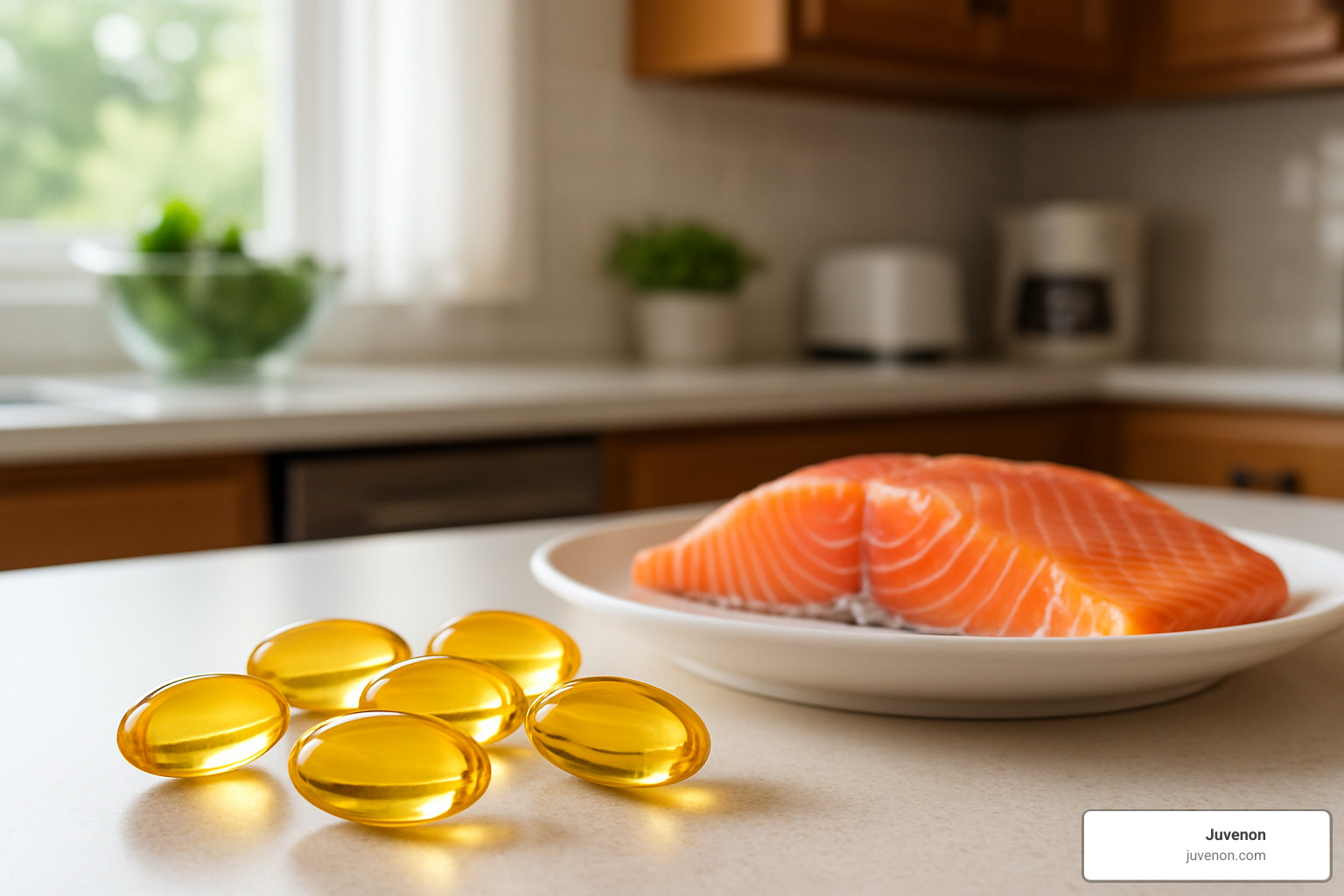
Best for: joint comfort & memory support
If you're waking up with stiff joints that take forever to loosen up, omega-3s might become your new best friend. These aging supplements shine particularly bright for folks experiencing:
Morning joint stiffness that makes you feel older than your years Those "where did I put my keys?" moments or general brain fog Skin and eyes that feel perpetually thirsty for moisture Early warning signs of heart health concerns
For most adults looking for healthy aging support, taking between 1-3 grams of combined EPA and DHA daily hits the sweet spot. Some conditions might benefit from up to 4 grams daily, but that's definitely something to discuss with your doctor first.
To put this in perspective, if you enjoyed a nice 3-ounce serving of wild salmon for dinner, you'd get about 1.5 grams of omega-3s. Most supplements provide around 1 gram per serving, so you'd need 1-3 capsules to reach the optimal range.
Sourcing & sustainability tips
I'm going to level with you—the omega-3 supplement aisle can be bewildering. Here's how to find the good stuff:
Look for the IFOS (International Fish Oil Standards) seal or other third-party testing. This means someone besides the manufacturer has verified what's actually in those capsules.
Quality matters! Seek out aging supplements that use molecular distillation or supercritical extraction. These fancy-sounding processes remove the mercury, PCBs and other contaminants you definitely don't want.
Check the EPA:DHA ratio based on your personal goals. Want to tame inflammation? Look for higher EPA. More concerned about brain health? Higher DHA is your friend.
Freshness counts—rancid fish oil is worse than no fish oil. Look for products that list their oxidation values (TOTOX, peroxide, and anisidine).
If you're vegetarian or concerned about our oceans (and who isn't these days?), algal oil offers a fantastic alternative. These supplements derive EPA and DHA directly from the same source fish get them from—algae! They cost a bit more but deliver comparable benefits with a much lighter environmental footprint.
#3 Collagen Peptides
Did you know collagen makes up nearly a third of all protein in your body and about 90% of your skin's protein? It's true! But here's the catch – our natural collagen production starts declining by about 1-1.5% yearly once we hit our mid-20s. This natural slowdown leads to some all-too-familiar signs of aging:
- Your skin loses its bounce and firmness
- Joints don't feel quite as cushioned anymore
- Hair and nails become more brittle
- Muscle tone becomes harder to maintain
This makes collagen peptides one of the most visibly rewarding aging supplements you'll find – you can actually see the difference in the mirror!
A fascinating 2019 randomized, placebo-controlled study finded that taking oral collagen improved skin hydration, elasticity, roughness, and density in older adults. Another 12-week study following 72 women who took just 2.5 grams of collagen daily showed remarkable improvements in skin elasticity and moisture.
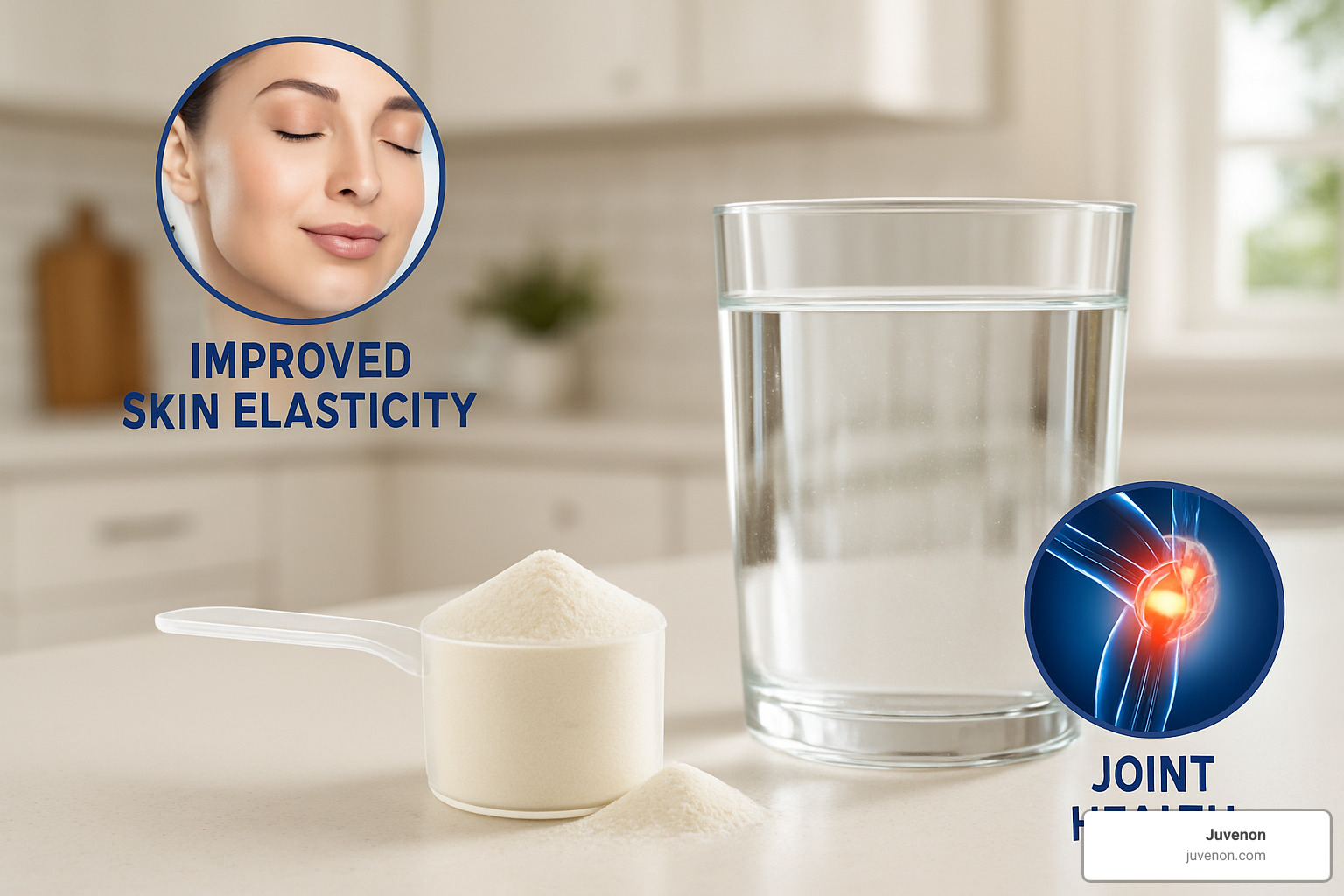
Best for: visible skin aging
If you're noticing those subtle (or not-so-subtle) signs of aging in the mirror, collagen peptides might be your new best friend. These aging supplements work wonders for addressing those pesky fine lines and wrinkles that seem to appear overnight. They're also fantastic for crepey or sagging skin that's lost its youthful bounce.
Beyond just your face, collagen can help strengthen brittle nails, support thinning hair, and even ease joint discomfort that might be slowing you down.
When shopping for collagen, you'll notice different types on the market. The main difference is how they're processed. Hydrolyzed collagen (often called collagen peptides) has been broken down into smaller, more digestible molecules that your body can absorb more easily. Native collagen, on the other hand, is less bioavailable – meaning your body can't use it as effectively.
For skin benefits, look for Types I and III collagen, while Type II tends to be more beneficial for supporting joint health.
When results show
Patience is key with collagen! Most clinical studies run for 8-12 weeks, which seems to be the sweet spot for seeing noticeable results. That said, many people report improvements in skin hydration within just 4 weeks – your morning mirror check might reveal more dewy, hydrated skin sooner than you think!
To get the most bang for your collagen buck, I recommend a few simple strategies. First, pair it with vitamin C, which your body needs to synthesize collagen effectively. Second, consistency matters – taking it daily yields much better results than sporadic use. Some people find that combining both oral and topical collagen gives them improved skin benefits. For dosage, aim for 2.5-10 grams daily to see optimal results.
At Juvenon, we've thoughtfully formulated our collagen products with vitamin C and hyaluronic acid to boost absorption and effectiveness. This makes them truly comprehensive aging supplements for anyone looking to support their skin's natural beauty from the inside out.
#4 Coenzyme Q10
Coenzyme Q10 (CoQ10) is like your body's little energy spark plug – something we naturally produce, but sadly, it starts disappearing as we age. By the time you hit 80, you've typically got less than half the CoQ10 you had at 20. That's a pretty significant drop for something so essential!
This decline matters because CoQ10 isn't just another supplement – it's a multitasking powerhouse in your body:
- It helps your mitochondria (those tiny cellular power plants) produce energy – in fact, 95% of your cellular energy depends on CoQ10's help
- It acts as a protective shield against oxidative damage
- It gives special attention to your heart, which has the highest concentration of mitochondria in your entire body
- It helps recycle other antioxidants like vitamin E, making your body's defense system more efficient
What's truly impressive is a 4-year study that followed 443 older adults taking CoQ10 and selenium. The results? They spent fewer days in the hospital and maintained better quality of life compared to those taking a placebo. That's not just statistics – that's more good days to enjoy life!
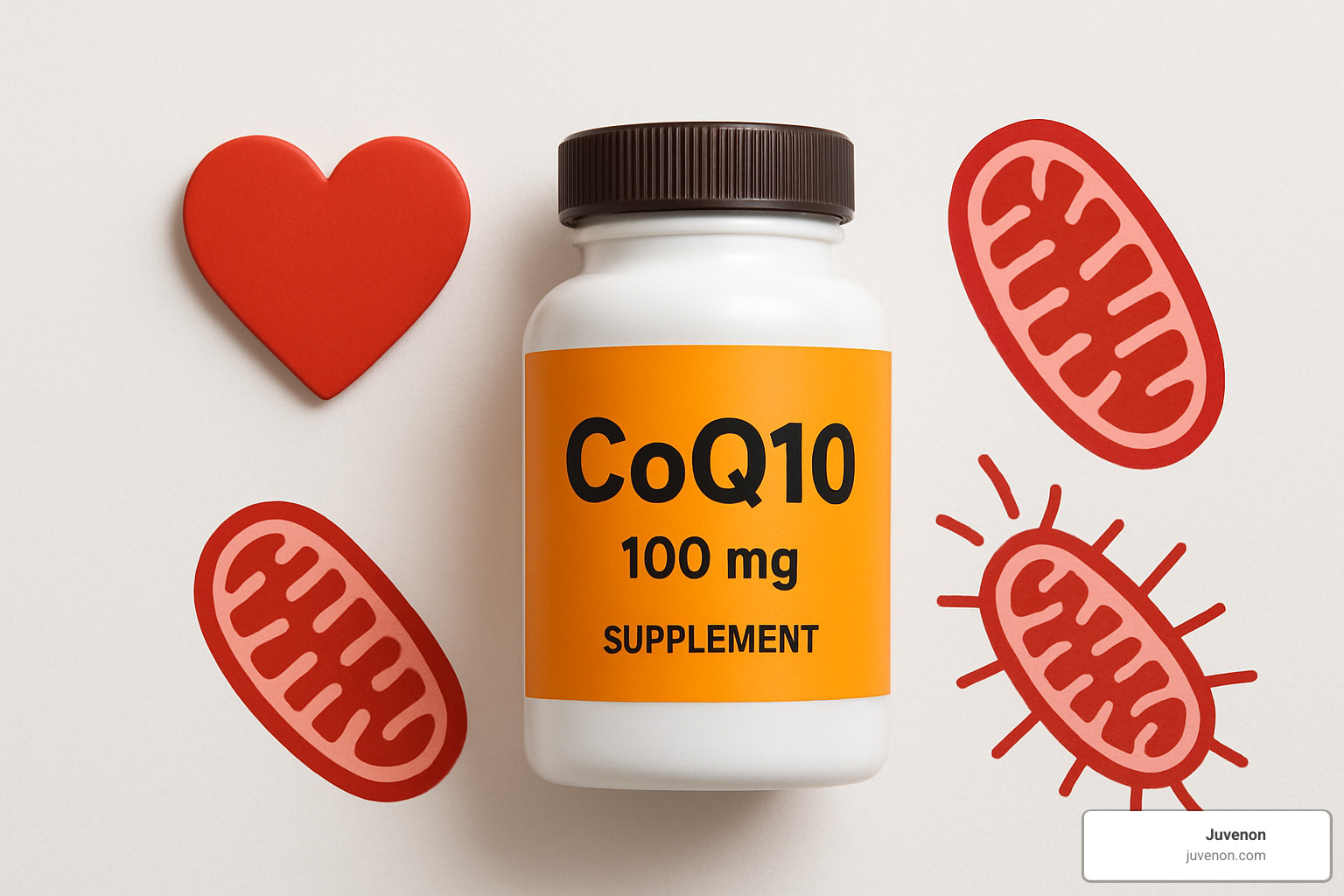
Best for: statin users & energy slump
Among aging supplements, CoQ10 is particularly valuable if you:
Take statin medications, which unfortunately deplete your body's CoQ10 stores (your doctor probably didn't mention this side effect!)
Find yourself battling that frustrating age-related fatigue – you know, when your energy just isn't what it used to be
Have cardiovascular concerns that keep you up at night
Simply want to support your cells with powerful antioxidant protection
When shopping for CoQ10, you'll notice two forms: ubiquinone and ubiquinol. While ubiquinone is more common and easier on your wallet, ubiquinol is the active form your body actually uses, and it's better absorbed, especially after 50. It's like choosing between regular and premium fuel for your car – the premium (ubiquinol) costs more but gives you better performance when you're older.
Study spotlight
The research behind CoQ10 is pretty remarkable. The Q-SYMBIO trial, which looked at CoQ10's effects on heart failure patients, found that those taking 300mg daily experienced a 43% decrease in cardiovascular mortality compared to the placebo group. That's not a small improvement – it's potentially life-changing.
But the benefits aren't just internal. Another 12-week study finded that CoQ10 supplementation reduced wrinkles and improved skin smoothness and firmness. Who doesn't want more energy AND better skin?
For the best results with CoQ10:
Take it with a meal containing some fat (it's fat-soluble, so this helps your body absorb it)
Start with 100-200mg daily (a bit more if you're taking statins)
Be patient – like many good things in life, it takes time. CoQ10 builds up in your system gradually, with full benefits often appearing after 1-3 months of consistent use
At Juvenon, we carefully formulate our CoQ10 supplements to ensure you're getting the most bioavailable form at the right dosage – because when it comes to your energy and heart health, you deserve the best.
#5 Resveratrol
Buzz about red wine being good for your heart? That's partly thanks to resveratrol, the compound behind the famous "French Paradox" where French people enjoyed lower heart disease rates despite diets rich in cheese and butter. While you'd need to drink hundreds of glasses of wine to get therapeutic amounts (please don't try this!), aging supplements with concentrated resveratrol offer the benefits without the hangover.
This fascinating polyphenol works its magic by activating sirtuins – a family of proteins that act like cellular guardians watching over your health and longevity. When you take resveratrol, it:
- Switches on SIRT1, often called the "longevity gene," which helps regulate how your cells age
- Supports your blood vessels, keeping them flexible and functioning well
- Helps maintain healthy insulin sensitivity (crucial as we age)
- Shields your cells from those pesky free radicals that cause oxidative damage
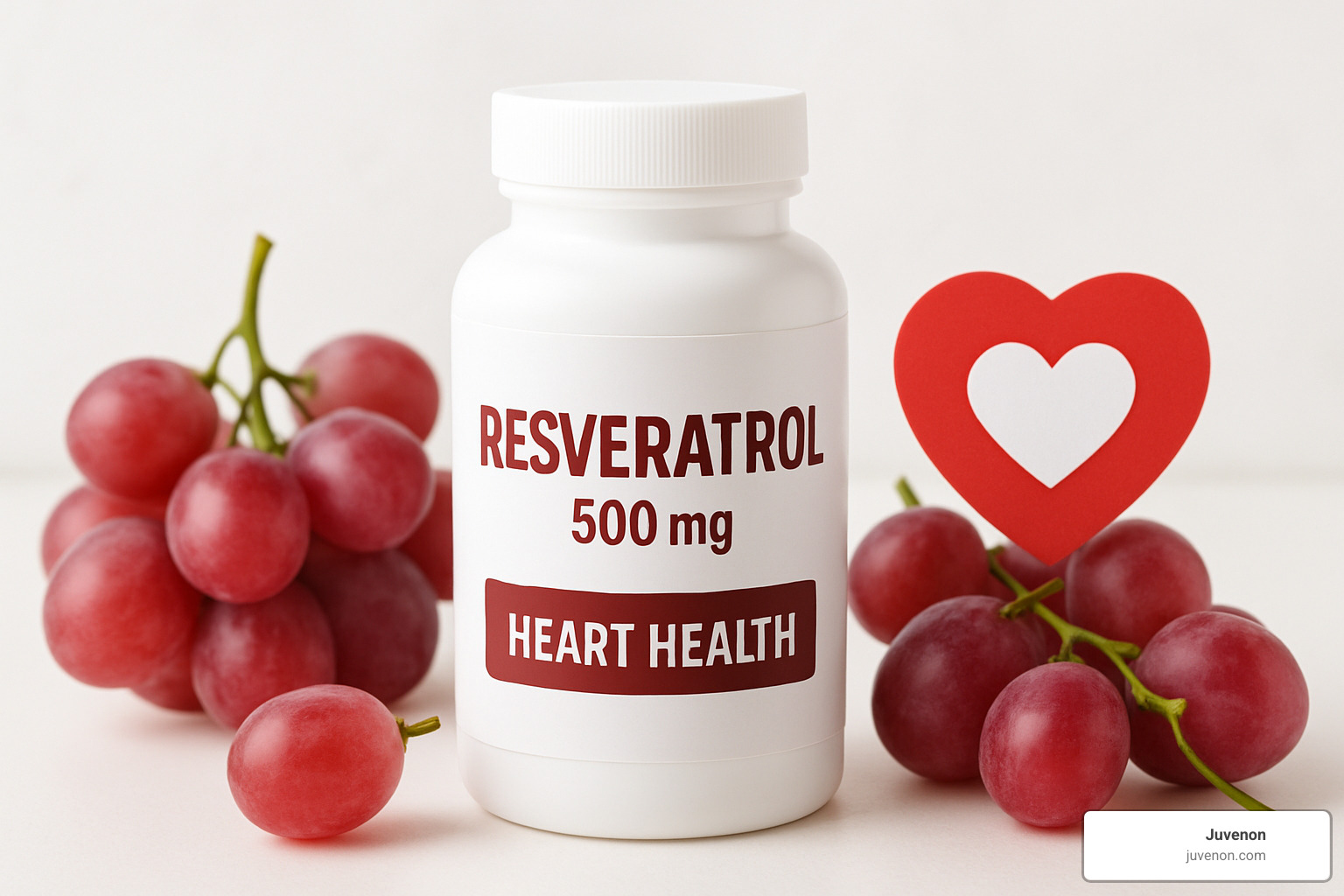
Best for: metabolic and circulatory support
As an aging supplement, resveratrol really shines when it comes to supporting your body's vital systems. It's particularly beneficial if you're concerned about:
Cardiovascular health – It helps maintain healthy blood pressure and supports proper blood vessel function. Think of it as a gentle tune-up for your circulatory system.
Blood sugar balance – As we age, our bodies often become less efficient at processing glucose. Resveratrol helps maintain those delicate balances.
Brain function – Your thinking cap needs good circulation too! Resveratrol supports healthy blood flow to the brain and may help protect neural connections.
Cellular longevity – By activating those sirtuin pathways, resveratrol speaks directly to your cells' built-in longevity mechanisms.
Let's debunk the "red wine myth" while we're here. While moderate wine consumption might contribute some benefits, research now suggests it's the Mediterranean diet's overall pattern, active lifestyle, and social connections that likely contribute more to longevity than just resveratrol alone.
When shopping for supplements, look specifically for trans-resveratrol – that's the active isomer with solid research backing it. Some formulas include pterostilbene, a cousin compound that offers similar benefits but might be better absorbed.
Dosing realities
Most clinical studies showing meaningful benefits used between 100-250mg of resveratrol daily. Some research has pushed this up to 1,000mg for specific conditions, but the sweet spot for most people falls in that lower range.
For your body to properly use this powerful compound, try these simple tips:
Take your resveratrol with a meal that contains some healthy fat – this dramatically improves absorption. Your morning avocado toast might be the perfect companion!
Consider micronized or liposomal formulations if available – these special processing methods help your body use more of the active compound.
Be patient and consistent – resveratrol works gradually, with benefits accumulating over time rather than providing instant results.
At Juvenon, we include carefully calibrated doses of resveratrol in our comprehensive aging supplements, often paired with complementary ingredients that improve its effectiveness. This thoughtful formulation approach means you get maximum benefit from every capsule.
#6 Curcumin (Turmeric Extract)
Curcumin, the golden compound that gives turmeric its vibrant color, might just be one of nature's most impressive gifts for healthy aging. This ancient spice has moved from traditional medicine cabinets to the spotlight of modern research, earning its place among our most recommended aging supplements.
What makes curcumin truly remarkable is how it supports healthy aging through multiple pathways simultaneously. It works like a symphony conductor – coordinating anti-inflammatory responses, neutralizing harmful free radicals, helping clear out aging "zombie" cells, and even crossing the blood-brain barrier to support your thinking brain.
The research is compelling. In an 18-month study, older adults taking just 90mg of curcumin twice daily showed meaningful improvements in memory and attention. Another study found that people with knee osteoarthritis experienced less joint pain and better mobility after supplementing with curcumin.
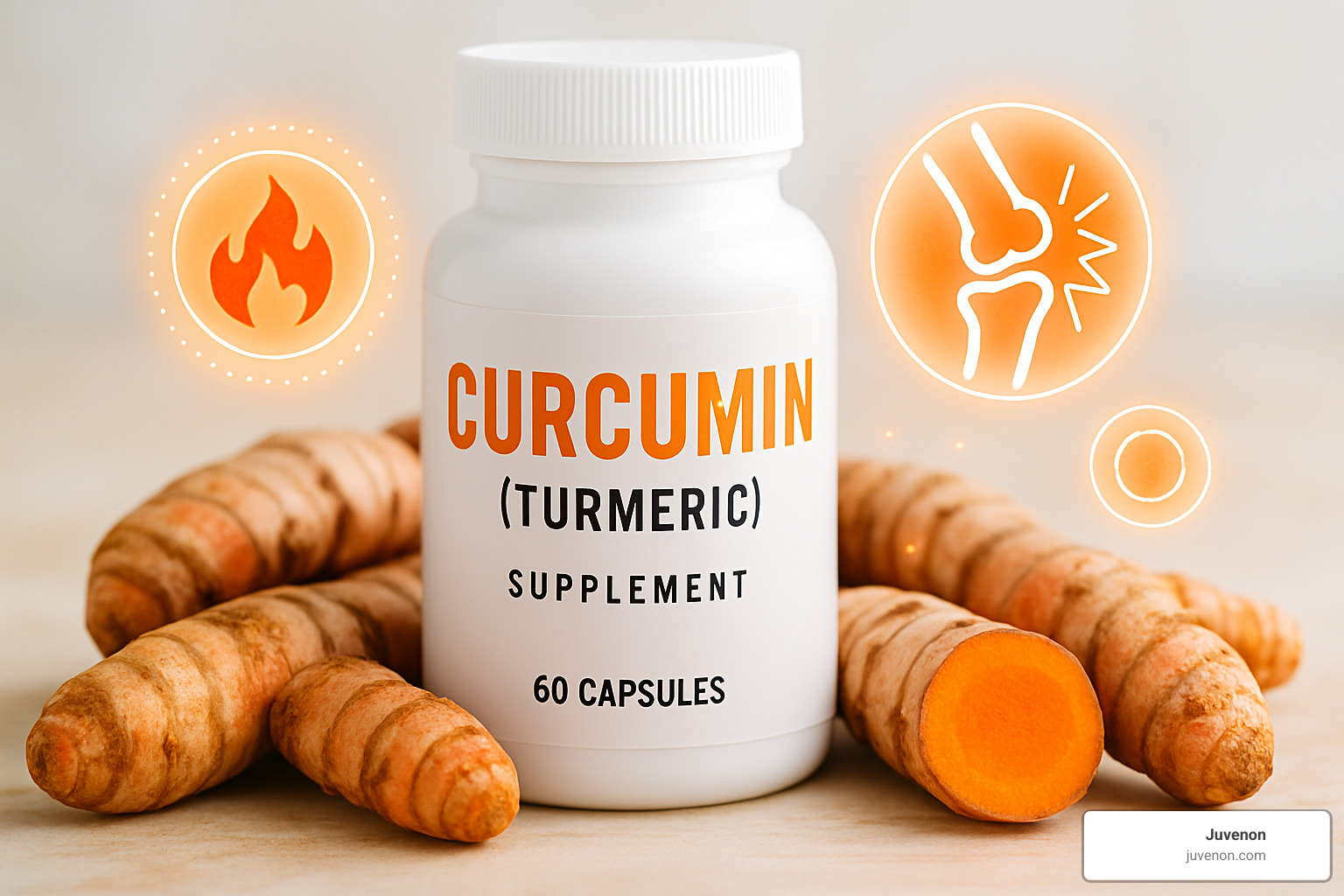
Best for: stiff joints & brain fog
If you're waking up with creaky joints or struggling to remember where you put your keys, curcumin might be your new best friend. As an aging supplement, it particularly shines for:
Joint comfort – Easing morning stiffness and supporting comfortable movement throughout the day.
Brain clarity – Helping to lift that frustrating mental fog and supporting memory function.
Whole-body calm – Addressing the low-grade inflammation that often accompanies aging.
Digestive ease – Promoting comfortable digestion and gut health.
Here's the challenge, though – curcumin is notoriously shy about being absorbed by your body. Regular turmeric powder contains only about 3% curcumin, and even concentrated extracts struggle to get where they need to go without some help.
That's why smart formulations include bioavailability boosters like black pepper extract (piperine), which can increase absorption by up to 2,000%. Other effective approaches include phospholipid complexes that make curcumin more fat-soluble, nano-sized particles for better cellular uptake, or turmeric essential oils containing absorption-enhancing turmerones.
Practical tip
While supplements deliver therapeutic amounts of curcumin, don't overlook the humble spice jar in your kitchen. Cooking with turmeric offers complementary benefits and is a delicious way to support your supplement routine.
Try warming your morning oatmeal with turmeric and a tiny pinch of black pepper, stirring it into soups or stews, or enjoying the increasingly popular golden milk (warm milk with turmeric, a bit of fat, and black pepper for better absorption).
For supplement dosing, most research points to benefits at 500-1,000mg of curcumin daily (not total turmeric). Taking this amount in two separate doses often works better than a single large dose, providing more consistent support throughout your day.
At Juvenon, we believe in the power of this golden spice so much that we've made it a cornerstone of our aging supplements lineup, always in forms designed for maximum absorption and benefit.
#7 Probiotics & Prebiotics
Did you know the trillions of tiny bacteria living in your gut might be one of your best allies for healthy aging? It's true! As we age, our gut microbiome naturally becomes less diverse, which scientists have linked to increased inflammation, weakened immune function, and even changes in how our brain works.
This is why probiotics and prebiotics have earned their place among our most valuable aging supplements. The evidence is compelling—a remarkable study found that about two-thirds of adults over 60 who took probiotics (or combinations of probiotics and prebiotics called synbiotics) experienced noticeable health improvements, including fewer infections.
The connection between your gut and your brain is particularly fascinating for healthy aging. Your gut microbiome isn't just about digestion—it's a busy factory that:
- Creates actual neurotransmitters that influence your mood and thinking
- Controls inflammation levels that can affect brain health
- Helps determine how well you absorb nutrients your cells need to function
- Maintains the integrity of your intestinal lining, preventing unwanted substances from leaking into your bloodstream
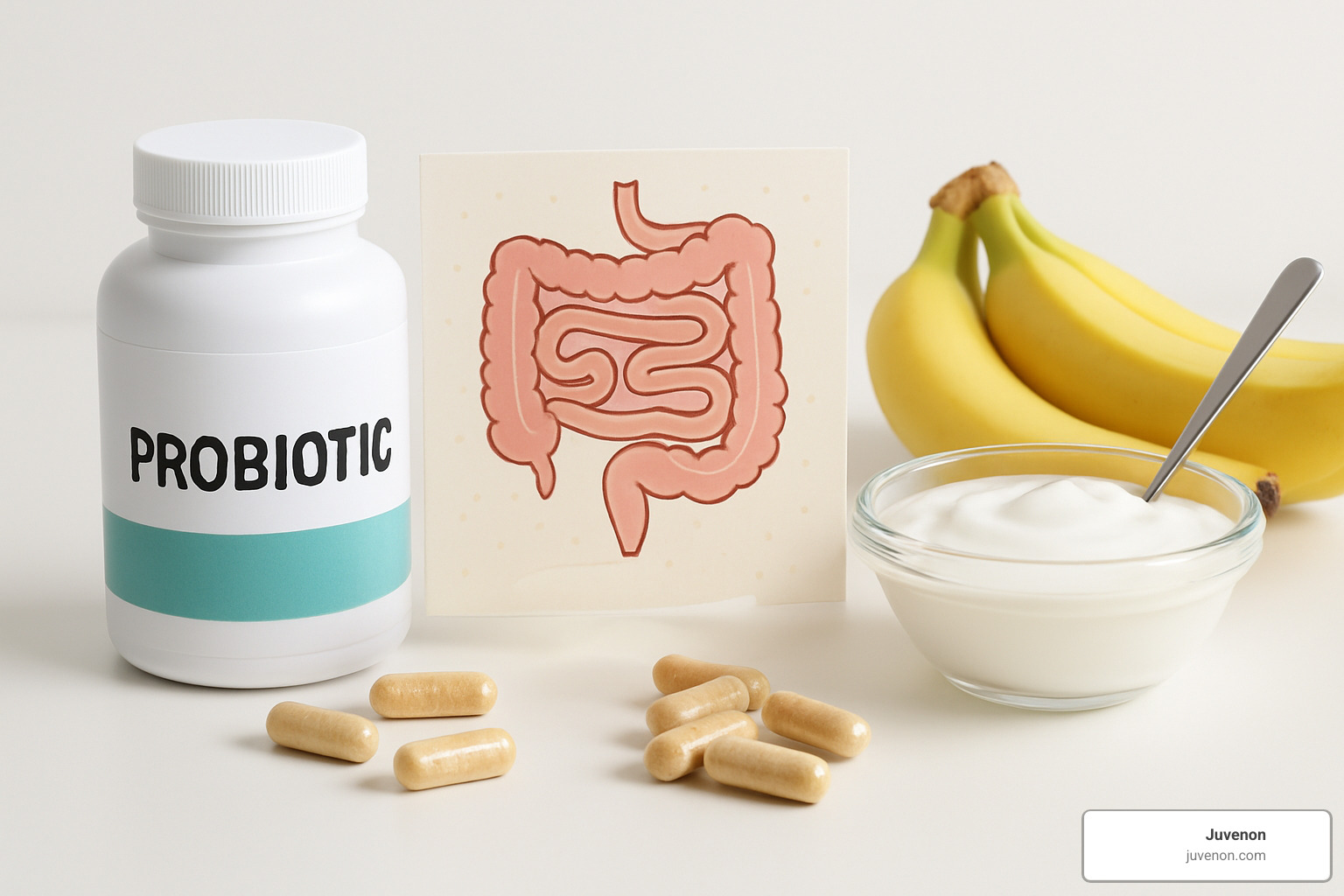
Best for: digestion & immune resilience
I often recommend probiotic and prebiotic aging supplements to my clients who are experiencing:
Digestive challenges – Those occasional uncomfortable moments or irregularity that seem to become more common as we age.
Frequent minor illnesses – If you're catching every cold that comes around, your gut-immune connection might need support.
Antibiotic recovery – These medications are sometimes necessary but can deplete your beneficial bacteria.
Inflammatory conditions – The gut plays a central role in managing your body's inflammatory responses.
When shopping for probiotics, I always remind people that specificity matters far more than fancy marketing claims. Different bacterial strains have different specialties—it's like hiring the right expert for the job. For example, Lactobacillus rhamnosus GG and Saccharomyces boulardii excel at helping you recover after antibiotics, while Bifidobacterium longum and Lactobacillus acidophilus may support mood and brain function.
You'll often see "CFUs" (colony-forming units) on probiotic labels, which indicates the number of viable bacteria. While bigger numbers might seem better, quality matters more than quantity. Most research shows benefits at 1-10 billion CFUs daily for general health, though specific conditions might warrant higher amounts.
Feeding your microbiome
Think of probiotics as beneficial garden plants and prebiotics as the fertilizer they need to thrive. You can take all the probiotic supplements in the world, but without the right food for those friendly bacteria, you won't get optimal results.
Good prebiotic sources include fibers like inulin and FOS (fructooligosaccharides), resistant starch, pectin, and beta-glucans. These compounds pass through your digestive system undigested until they reach your lower intestine, where your beneficial bacteria feast on them.
At Juvenon, we believe in a "whole ecosystem" approach to gut health. Rather than just adding probiotics, we focus on creating an environment where beneficial bacteria naturally flourish. This means combining carefully selected probiotic strains with prebiotic fibers and polyphenol-rich compounds that support microbial diversity.
This balanced approach helps maximize the benefits of these aging supplements for not just gut health, but your entire body—from your immune system to your brain. After all, good health truly does begin in the gut!
Comparing Supplements vs Whole-Food Sources
When it comes to supporting healthy aging, both supplements and whole foods have important roles to play. At Juvenon, we're passionate advocates for high-quality aging supplements, but we always emphasize that they work best alongside a nutrient-rich diet – not as a replacement for one.
Let's look at how supplements compare to whole foods when it comes to key anti-aging nutrients:
| Nutrient | Supplement Form | Whole Food Source | Considerations |
|---|---|---|---|
| Omega-3s | 1g fish oil capsule | 3oz wild salmon (1.5g) | Food provides protein and additional nutrients; supplements offer consistency |
| Vitamin C | 500mg tablet | 1 orange (70mg) | Food provides fiber and flavonoids; supplements offer therapeutic doses |
| Curcumin | 500mg extract | 1 tsp turmeric (15mg) | Supplements offer concentrated amounts with absorption improvers |
| CoQ10 | 100mg ubiquinol | 3oz beef heart (2.6mg) | Supplements are the only practical way to get therapeutic amounts |
| Resveratrol | 100mg capsule | 1 bottle red wine (12.5mg) | Supplements avoid alcohol and provide consistent dosing |
| Probiotics | 10 billion CFU capsule | 1 cup yogurt (variable) | Supplements offer targeted strains; foods provide diverse benefits |
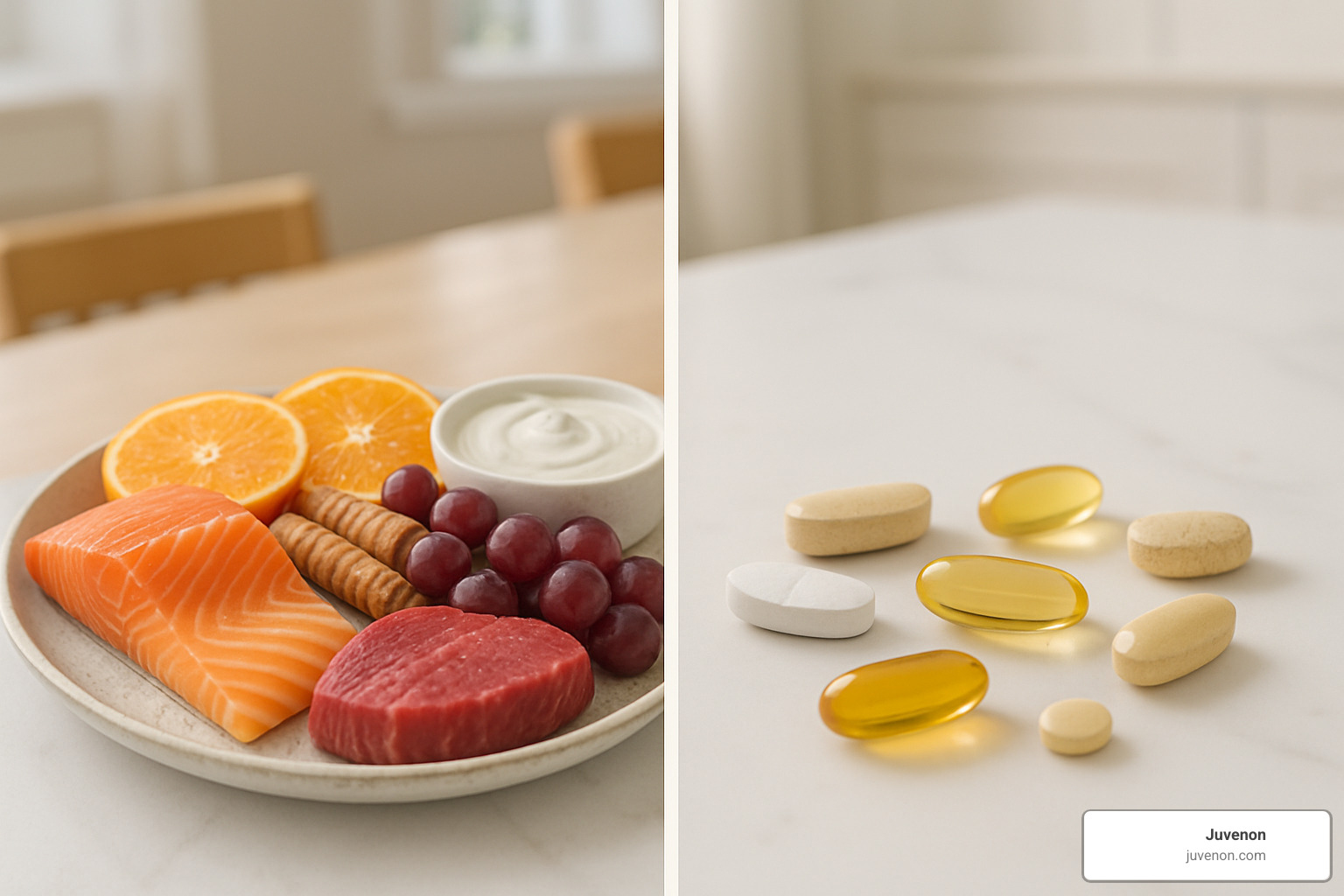
Nature packages nutrients differently than we do in supplements, and this natural packaging comes with some remarkable benefits. When you bite into a juicy orange, you're getting more than just vitamin C – you're consuming a complex matrix of fiber, flavonoids, and other compounds that work together in ways science is still finding.
Food offers several advantages that even the best supplements can't match. The natural food matrix often improves how well nutrients are absorbed and used by your body. Think of it as the difference between a symphony orchestra and a solo performer – both can be beautiful, but they create different experiences.
Whole foods contain thousands of phytonutrients that work synergistically, many of which we haven't even identified yet, let alone put into supplement form. The fiber in whole foods supports gut health and helps regulate the absorption of nutrients. And let's not forget the simple pleasure of eating – the satisfaction and enjoyment of a delicious meal nourishes more than just our bodies.
However, aging supplements bring their own set of important benefits to the table. They can deliver therapeutic doses of key nutrients that would be difficult or impossible to get from diet alone. For example, you'd need to eat several pounds of beef heart daily to match the CoQ10 in a single supplement capsule!
Supplements also offer consistency that's not dependent on seasonal availability, soil quality, or food preparation methods. They provide a convenient solution, especially for those with dietary restrictions or limited access to fresh foods. And perhaps most importantly, they allow for targeted support to address specific deficiencies or health concerns.
The cost comparison between supplements and whole foods isn't always straightforward either. While a bottle of high-quality fish oil might seem expensive initially, it can actually be more economical than consuming enough wild salmon to get equivalent omega-3s. On the other hand, getting your vitamin C from oranges and bell peppers might be cheaper than supplements – plus you get all those additional benefits.
Absorption differences matter too. Some nutrients are actually better absorbed from supplements (especially those with improved bioavailability), while others are more readily used by the body when they come from food sources.
The ideal approach combines nutrient-dense whole foods with strategically chosen aging supplements that address your specific needs and fill nutritional gaps. Think of supplements as reinforcements for your dietary foundation – not substitutes for it. When you combine the best of both worlds, you create a comprehensive nutritional strategy for healthy aging.
Potential Risks & How to Supplement Safely
Let's have an honest conversation about supplements. While the right aging supplements can be powerful allies in your wellness journey, they're not magic pills - and they do come with considerations we should discuss.
Think of supplements like tools in your health toolkit. Used correctly, they're incredibly helpful. Used incorrectly? Well, that's where problems can arise.
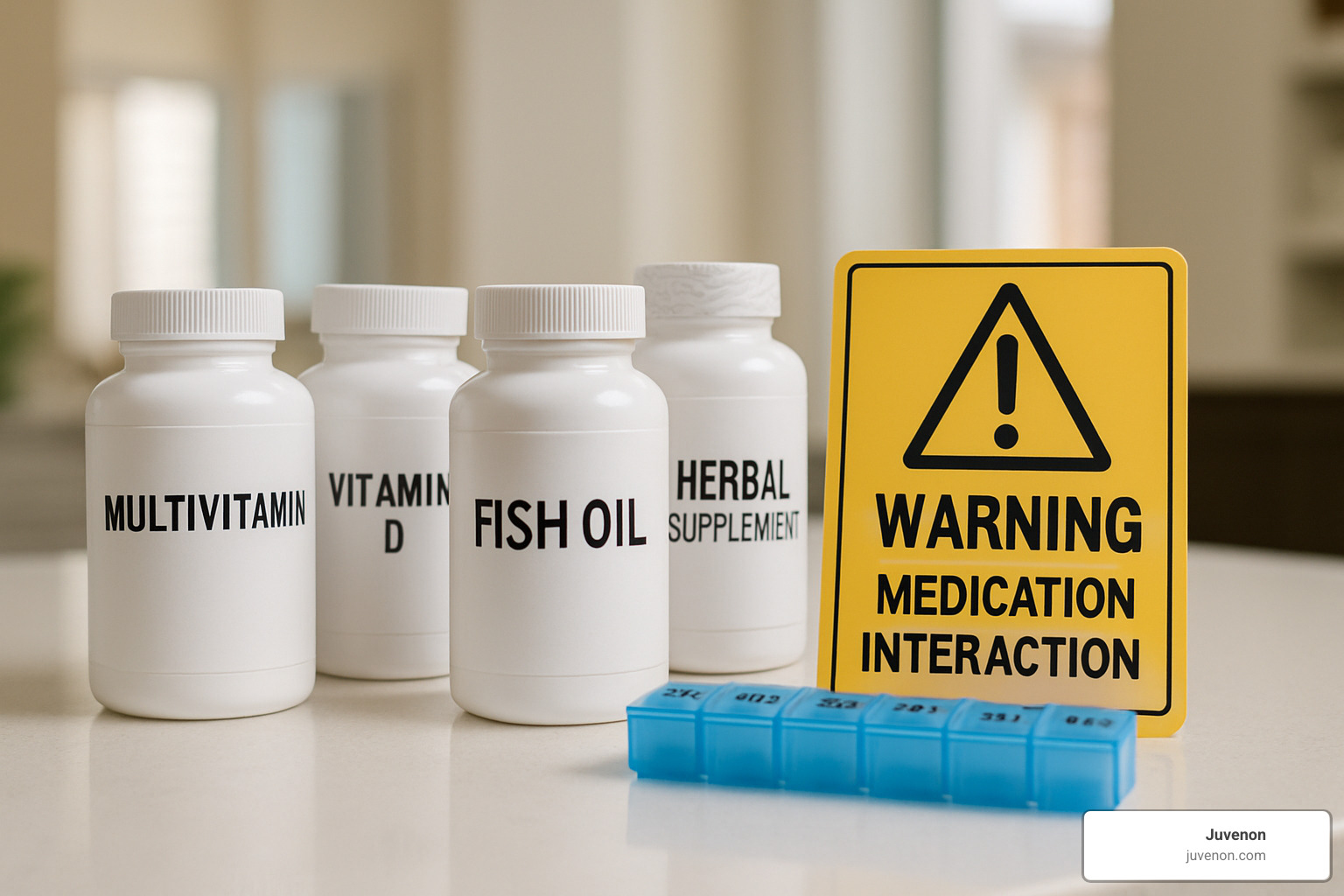
I've seen many people dive into supplementation without understanding the potential interactions with their medications. For example, that CoQ10 that's great for your heart? It might affect how your blood thinner works. Or that innocent-looking St. John's Wort? It can actually make your prescription medications less effective by changing how your liver processes them.
Quality matters tremendously with supplements. Unlike prescription drugs, supplements don't require FDA approval before hitting the market. This creates a bit of a "Wild West" scenario where not all products deliver what their labels promise. At Juvenon, this is why we're almost obsessive about quality testing - because what's the point of taking something if it doesn't contain what it claims?
To stay safe while enjoying the benefits of aging supplements, look for products with third-party certification symbols from organizations like NSF, USP, or ConsumerLab. These independent groups verify that what's on the label is actually in the bottle - no more, no less.
When starting any new supplement, I always suggest the "low and slow" approach. Start with a lower dose than recommended, then gradually increase as your body adjusts. And please, keep track of what you're taking! A simple supplement diary can help you connect any changes you notice to specific supplements.
Who should avoid certain aging supplements
Some of us need to be extra cautious with supplements. If you're living with kidney disease, certain minerals can build up in your system to harmful levels. Anyone taking blood thinners like warfarin needs to be particularly careful with vitamin K, ginkgo, garlic supplements, and even omega-3s at high doses.
I remember a client who was preparing for knee surgery and didn't realize she needed to stop her ginkgo and fish oil supplements beforehand. Her surgeon was quite concerned about potential bleeding risks. This is why communication with your healthcare providers about everything you're taking is so important.
Other special considerations include:
- Immunosuppressant medications can interact with immune-stimulating herbs like echinacea
- Hormone-sensitive conditions may be affected by supplements containing phytoestrogens
- Iron supplements can be harmful for those not deficient or with conditions like hemochromatosis
- Vitamin A in retinol form can cause problems at high doses, particularly for pregnant women
When to talk to your healthcare provider
I believe in informed partnership with healthcare providers. While some doctors might not be extensively trained in supplements, opening the conversation is crucial - especially if you:
Take prescription medications regularly. The potential interactions are too important to ignore.
Have chronic health conditions like diabetes, heart disease, or autoimmune disorders. These conditions often change how your body processes supplements.
Are planning surgery in the near future. Many supplements affect bleeding risk and should be paused before procedures.
Experience any unusual symptoms after starting supplements. Your body is talking to you - listen to it!
The best approach is personalized and evidence-based. This might include appropriate lab testing to check for deficiencies before supplementing, a thorough review of your medications, and regular check-ins as your health needs evolve.
At Juvenon, we believe supplementation should be thoughtful, targeted, and regularly reassessed. Aging supplements can provide remarkable benefits when used as part of an intelligent, personalized wellness plan. The goal isn't to take the most supplements - it's to take the right ones for your unique body and health needs.
Frequently Asked Questions about Aging Supplements
Do aging supplements really slow aging or just mask symptoms?
I hear this question all the time, and it's a good one. The truth is somewhere in the middle. While most aging supplements don't literally turn back your biological clock, they can target specific age-related processes and meaningfully improve your healthspan—those precious years you spend feeling vital and well.
Think of it this way: your body is like a complex machine that gradually wears down over time. Some supplements act like specialized maintenance tools:
Vitamin D and omega-3s support fundamental cellular processes that naturally decline as we age. CoQ10 helps neutralize the oxidative stress that accumulates in our cells over time—like rust protection for your body. Collagen doesn't stop the aging process, but it replaces what your body produces less of each year. And newer supplements like NAD+ precursors may help maintain cellular energy production that diminishes as birthdays add up.
What matters most isn't just how long you live, but how well you live during those years. While research on extending human lifespan is still developing, many aging supplements have solid evidence for helping maintain physical function, mental sharpness, and overall quality of life. That's what I call aging gracefully!
How do I know which aging supplements I actually need?
With so many options available, finding your personal supplement sweet spot comes down to a thoughtful, individualized approach.
Start by asking yourself what aspects of aging concern you most. Is it creaky joints that make morning yoga a challenge? Fine lines appearing around your eyes? Energy levels that aren't what they used to be? Or maybe those occasional "where did I put my keys?" moments?
A blood test can reveal specific deficiencies—vitamin D levels, for instance, are commonly low in adults over 50, especially during winter months. Keeping a food diary for a week might show nutritional blind spots in your diet. And don't forget to consider medications you take regularly, as some can deplete specific nutrients over time.
For most people, I recommend starting with the foundations: - A high-quality multivitamin matched to your age and gender - Vitamin D3+K2 (especially important if you live in northern climates) - Omega-3s (if salmon isn't a regular guest at your dinner table)
From there, you can add targeted aging supplements based on your specific concerns and health goals. Supplementation isn't one-size-fits-all—what works wonderfully for your neighbor might not be what your body needs most.
Can lifestyle beat supplements for longevity?
In a word: absolutely! The research couldn't be clearer on this point. While I'm passionate about the benefits of quality supplements, they simply can't replace the fundamentals of a healthy lifestyle.
The most powerful anti-aging strategies don't come in bottles. Regular movement—both heart-pumping cardio and muscle-strengthening resistance training—remains one of the most potent longevity medicines available. A Mediterranean-style diet rich in colorful vegetables, fruits, whole grains, olive oil, and fish provides thousands of beneficial compounds that work synergistically. Quality sleep (7-8 hours of the restorative kind) allows your body to repair and refresh. Managing stress through practices like meditation or yoga helps regulate inflammation. And perhaps most surprisingly powerful: meaningful social connections and community engagement.
A fascinating 2023 study in The Lancet found that participants with higher physical activity levels and optimal sleep experienced the slowest cognitive decline. Interestingly, even intense exercise couldn't make up for poor sleep—highlighting why we need to address all these pillars of health.
The smartest approach combines these lifestyle foundations with thoughtfully chosen supplements. Aging supplements work best when they're supporting an already healthy lifestyle rather than trying to compensate for poor habits. Think of supplements as improvers, not replacers, of the daily choices that truly determine how well we age.
Conclusion
The science of aging is complex, but supporting healthy aging doesn't have to be complicated. After diving deep into research and evidence, it's clear that the most effective approach combines several key elements that work together synergistically.
Think of healthy aging as a house - you need a solid foundation, strong walls, and a good roof. Your foundation is a nutrient-dense diet packed with colorful plants, quality proteins, and healthy fats. The walls that support everything are regular physical activity (both strength training and cardiovascular exercise), along with quality sleep and effective stress management. The roof that protects it all? Meaningful social connections and a sense of purpose that gets you out of bed each morning.
And where do aging supplements fit in this metaphor? They're like the specialized tools that help repair weak spots and reinforce the structure when needed.
At Juvenon, we don't believe in magic pills or fountain-of-youth promises. What we do believe in is science. Our supplements are carefully formulated based on decades of research into the cellular mechanisms of aging. Each product is developed by leading scientists who specialize in longevity research, manufactured in GMP-certified facilities that meet the highest quality standards, and third-party tested to ensure what's on the label is exactly what's in the bottle.
And because we stand behind our products, everything comes with our 60-day satisfaction guarantee. If you don't feel a difference, we want to know about it.
Healthy aging isn't about trying to look 25 forever—it's about maintaining your physical abilities, sharp thinking, and quality of life as the years pass. The right aging supplements can be valuable tools in this journey, but they work best when they're part of a comprehensive approach to wellness.
I've spent years studying both traditional wisdom from the world's healthiest cultures and cutting-edge nutritional science. What's fascinating is how often they point to the same conclusions: that movement, whole foods, community, purpose, and targeted nutrition support can help us not just live longer lives, but better ones—with more energy, mobility, and joy at every stage.
After all, the goal isn't just adding years to your life. It's adding life to your years.























